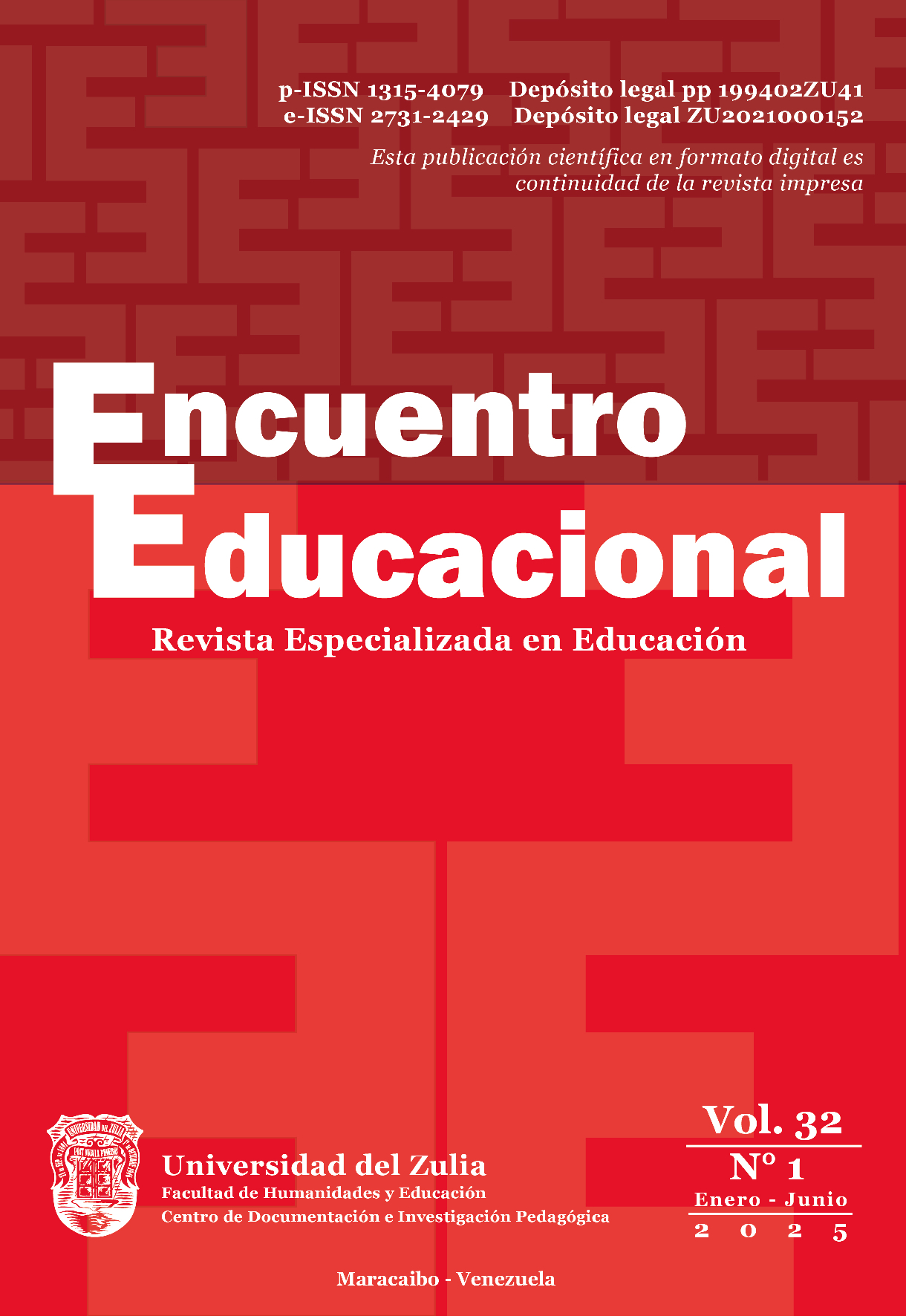Propuesta de Programa de Formación de Redacción Periodística en Plataformas Digitales
Proposal for a Training Program in Journalistic Writing for Digital Platforms
Abstract
The evolution of digital technologies brings with it a transformation in the profile of journalists and their adaptability skills in this new world. This research aims to propose the creation of a course for teaching journalistic writing on digital platforms at the School of Social Communication of the Faculty of Humanities and Education, University of Zulia. To this end, a diagnostic assessment was conducted among the students of the School to identify knowledge gaps in writing for digital platforms. The methodology used was quantitative, with a projective type of research. Aspects such as the construction of written texts and the fundamental elements that a journalist must know in the new era of digital innovation were taken into account to prepare future professionals for the new profile required by these new forms of communication. After the diagnosis, a gap was found regarding writing for online platforms in the current program, which results in students being unaware of fundamental aspects of this area. Given this situation, a training program is proposed for the creation of a course that will allow students to consider different options for their professional lives.
Downloads
References
Bastos, S., Lopezosa, C., & Tous Rovirosa, A. (2024). La evolución y el impacto del SEO en el periodismo en los últimos cinco años: Revisión sistemática. Estudios sobre el Mensaje Periodístico, 30(1), 25–34. https://revistas.ucm.es/index.php/ESMP/article/view/92157
Boza, M. (2016). La escritura en los entornos digitales. Educare, 20(1), 153–176. https://revistas.investigacion-upelipb.com/index.php/educare/article/view/99/101
Carrasco, G., & Naranjo, N. (2017). Periodismo digital en Venezuela: El dilema del tráfico y la calidad. Comunicación, (178), 60–71. https://dialnet.unirioja.es/servlet/articulo?codigo=6153455
Flower, L., & Hayes, J. (1996). La teoría de la redacción como proceso cognitivo. En *Texto en Contexto* (Vol. 1, pp. 73–110). Asociación Internacional de la Lectura. https://isfd87-bue.infd.edu.ar/sitio/upload/Flowers_y_Hayes.pdf
Franco, G. (2008). Cómo escribir para la web. Bases para la discusión y construcción de manuales de redacción online. Iniciativa del Centro Knight para Periodismo en las Américas, Universidad de Texas, Austin.
Hernández-Sampieri, R., & Mendoza, C. (2018). Metodología de la investigación. Las rutas cuantitativa, cualitativa y mixta. McGraw Hill Education.
Hurtado de Barrera, J. (2000). Investigación proyectiva: Más allá de la investigación tecnológica. Impacto Científico, 19(1), 13–26. https://produccioncientificaluz.org/index.php/impacto/article/view/42213
Instituto Prensa y Sociedad, IPYS Venezuela. (2022). Atlas del Silencio. https://ipysvenezuela.org/atlas-del-silencio/paisaje/
Limbach, A. (2023, 11 de abril). Periodismo automatizado: La IA ya escribe noticias, las verifica y ofrece información personalizada. https://theconversation.com/periodismo-automatizado-la-ia-ya-escribe-noticias-las-verifica-y-ofrece-informacion-personalizada-202803
López, M. (2008). Posicionamiento en buscadores. Taller/Curso práctico. LibroSEO.net. https://www.mfbarcell.es/documentos_destacados/Libro-SEO-Posicionamiento-en-Buscadores.pdf
Lopezosa, C., Pérez-Montoro, M., & Rey Martín, C. (2024). El uso de la inteligencia artificial en las redacciones: Propuestas y limitaciones. Revista de Comunicación, 23(1), 279–293. https://revistadecomunicacion.com/article/view/3309
Lopezosa, C., Trillo-Domínguez, M., Codina, L., & Cabrera, M. (2021). El SEO en la empresa periodística: Percepciones y elementos clave para su adopción en las redacciones. Revista Latina de Comunicación Social, (79), 27–45. https://nuevaepoca.revistalatinacs.org/index.php/revista/article/view/972
Naranjo, I., Moscoso, M., & Andrade, B. (2022). Importancia de las plataformas virtuales para la investigación de marketing en tiempos de COVID-19. Enfoques, 6(23), 264–274. https://revistaenfoques.org/index.php/revistaenfoques/article/view/154
Nielsen, J. (1997, 30 de septiembre). How Users Read on the Web (Cómo leen los usuarios en la Web). Nielsen Norman Group. https://www.nngroup.com/articles/how-users-read-on-the-web/
Nielsen, J. (2012, 12 de agosto). SEO and Usability (SEO y usabilidad). Nielsen Norman Group. https://www.nngroup.com/articles/seo-and-usability/
Nielsen, J. (2017, 29 de enero). Microcontent: A Few Small Words Have a Mega Impact on Business. Nielsen Norman Group. https://www.nngroup.com/articles/microcontent-how-to-write-headlines-page-titles-and-subject-lines/
Salaverría, R., & Negredo, S. (2008). Periodismo integrado, convergencia de medios y reorganización de redacciones (1ª ed.). Sol90 Media. https://www.researchgate.net/publication/268810171_Periodismo_integrado_convergencia_de_medios_y_reorganizacion_de_redacciones
SEO Salamanca. (2021, 11 de marzo). Importancia de la redacción SEO dentro del posicionamiento web. https://www.seosalamanca.com/posicionamiento-seo/importancia-de-la-redaccion-seo-dentro-del-posicionamiento-web-2/
Tarazona, A. (2022). Redacción periodística para periódicos digitales [Trabajo de pregrado, Universidad Nacional del Santa]. https://repositorio.uns.edu.pe/bitstream/handle/20.500.14278/4067/52547.pdf?sequence=1&isAllowed=y
Valbuena, N. (2023). Periodismo digital: Una era de cambios. #PerDebate, 7(1), 78–91. https://revistas.usfq.edu.ec/index.php/perdebate/article/view/3049


















